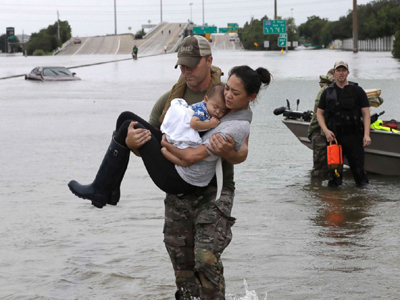| « Biblical Level Hurricane Harvey Rain | Hurricane Harvey: An Epic Disaster, An Environmental Nightmare » |
Public Health Emergency in Southeastern Texas
Stephen Lendman
Health and Human Services (HHS) Secretary Tom Price declared a public health emergency in Texas in response to Hurricane Harvey, saying:
“HHS is taking the necessary measures and has mobilized the resources to provide immediate assistance to those affected by Hurricane Harvey.”
“We recognize the gravity of the situation in Texas, and the declaration of a public health emergency will provide additional flexibility and authority to help those who have been impacted by the storm.”
Conditions are dire following six days of heavy rain and severe flooding. Over 20 Houston area hospitals evacuated patients and/or temporarily closed, others operating under emergency conditions.
Roads to the University of Texas MD Anderson’s Medical Center remain impassable. On Monday, employees were told to stay home until further notice.
Houston and surrounding areas face a likely public health disaster because of huge amounts of toxins released into the air and water, turning the area into a dangerously polluted swamp.
Entire neighborhoods and waterways are contaminated. Residents in flood-ravaged areas are in harm’s way, vulnerable to cholera, other bacterial infections, Legionnaires’ disease, mosquito-borne viruses, and other health hazards.
The Texas Department of State Health Services warned of an emerging public health nightmare. “Avoid contact with floodwater,” it said.
“It may contain bacteria, hazardous chemicals and dangerous debris. Never eat foods that have touched flood water. Even canned goods could become contaminated. Drinking water may not be available or safe to drink.”
Good advice is hard to heed by countless numbers of people surrounded by water flooding their homes, streets and surrounding areas.
On Monday, two reservoirs were drained, drinking water likely becoming mixed with floodwater, making it unsafe to ingest.
Mayo Clinic physician James Steckelberg urged caution in handling food and medications exposed to flood or unsafe municipal water following a hurricane.
Contamination from “toxins or germs…can cause illnesses, such as hepatitis or gastroenteritis” from E. coli bacteria, he explained.
Eat nothing possibly contaminated by floodwater, including “food packed in plastic, paper and cardboard containers that have been water damaged. Discard food and beverage containers with screw caps, snap lids, crimped caps (soda bottles), twist caps or flip tops, and home-canned food if they have come into contact with flood water. These containers cannot be disinfected. If in doubt, throw it out.”
Other bacteria in floodwaters can cause diarrhea, vomiting, fever, stomach pain and dehydration. Bacterial illnesses are commonplace after major hurricanes like Katrina, Harvey and others - some cases causing fatalities.
Bacteria can be ingested by inhaling airborne moisture droplets. Floodwaters make structures vulnerable to mold, especially in humid areas like Houston and surroundings with electrical power out.
Mold spores risk serious health problems, including asthma, other respiratory problems, rashes and allergies.
It’s mosquito season in Texas, standing water hospitable to them multiplying. Some carry serious viruses, including Zika and yellow fever.
The nightmare caused by torrential rain and flooding won’t end when normal weather conditions return.
It’s just beginning, given a continuing public health emergency and enormous task of rebuilding and restoring what severe hurricane winds and rain destroyed.
The cost alone will be staggering. Households inadequately insured or without coverage are out of luck.
According to FEMA data, Houston’s Harris County has 25,000 fewer flood-insured properties than in 2012, a 9% drop. Pasadena southeast of Houston is down nearly 20% - Baytown east of Houston down 22%.
Former federal flood insurance program head Robert Hunter called the figures “unbelievable,” adding:
“When you start to see policies drop like this, FEMA should have done something about this.” He estimates fewer than two in 10 homeowners with flood damage have insurance coverage.
Tropical Storm Allison 16 years ago was the last area big one causing severe flooding. Uninsured homeowners thought they were safe, a costly mistake they’re stuck with.
-###-
Stephen Lendman lives in Chicago. He can be reached at lendmanstephen@sbcglobal.net.
VISIT MY NEW WEB SITE: stephenlendman.org (Home - Stephen Lendman)
My newest book as editor and contributor is titled "Flashpoint in Ukraine: How the US Drive for Hegemony Risks WW III."
Listen to cutting-edge discussions with distinguished guests on the Progressive Radio News Hour on the Progressive Radio Network.



